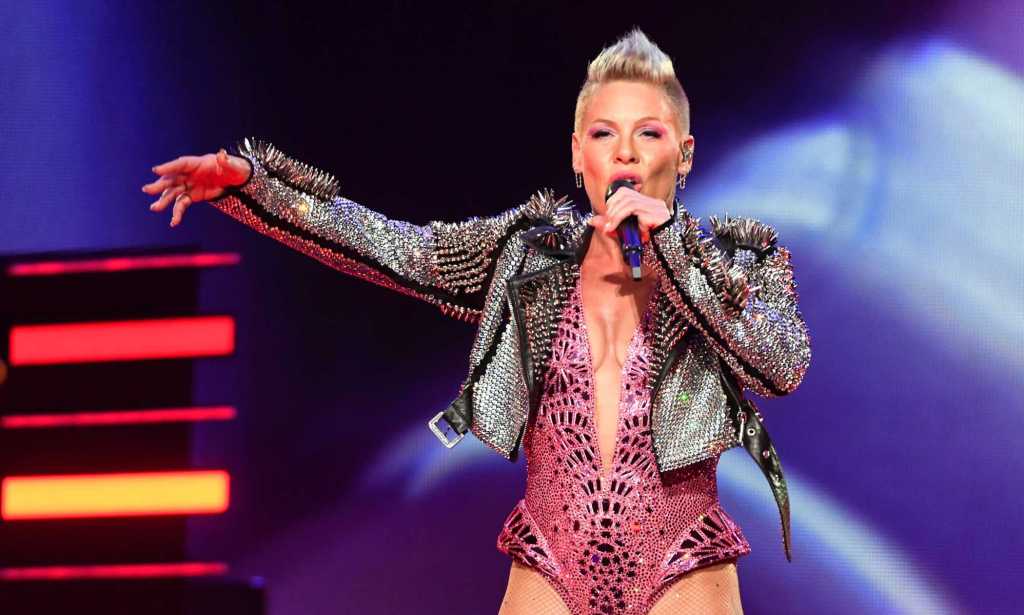Pink celebrates hometown as school board president swears in on banned books

Pink joined in the celebrations after her hometown elected a school board president who swore in on a stack of frequently banned books. (X/@dianachka82/Getty Images)
Pink has been among the first to celebrate her home state of Pennsylvania after newly elected school board president Karen Smith made a rebellious statement on book bans.
Smith was chosen as the president of the Central Bucks school board earlier this month and decided that, rather than being sworn in with her hand on the Bible, she would be sworn in with her hand on a stack of frequently banned books.
She and other Democrats like her had been vocal about their opposition to the former Republican-led school board’s policy to prohibit so-called “sexualised content”, making it easier to ban books from school libraries – particularly those with LGBTQ+ or diversity-related themes.

At the time, Smith’s opposition had been outnumbered. But as soon as Smith was elected president of the Central Bucks school board, she made it crystal clear that regressive book ban policies wouldn’t be in place for long.
“I’m not particularly religious”, she said, per The Philadelphia Inquirer, after swearing in on a stack of six frequently banned books.
“The Bible doesn’t hold significant meaning for me, and given everything that has occurred in the last couple of years, the banned books, they do mean something to me at this point.”
Of course, it wasn’t long before Smith’s gesture made it to the internet, with photos of her swearing on books like The Bluest Eye by Toni Morrison and Night by Eli Wiesel going viral.
Among those who showed support for Smith online was “Just Give Me A Reason” singer Pink, who is originally from Doylestown Township, Pennsylvania.
Re-posting the photo of Smith to X (formerly Twitter), the songstress wrote: “Makes me proud of my hometown!!!!!!”
The symbolic gesture is particularly special for Pink, who has been using her own platform to criticise book bans.
Back in November, the “So What” singer teamed up with PEN America to donate thousands of copies of frequently banned books to fans who attended her gigs in Florida – the state with the most banned books in public school classrooms and libraries.
“Books have held a special joy for me from the time I was a child, and that’s why I am unwilling to stand by and watch while books are banned by schools,” she said during an Instagram Live discussion with PEN America CEO Suzanne Nossel and poet Amanda Gorman last month.
“It’s especially hateful to see authorities take aim at books about race and racism and against LGBTQ authors and those of color. We have made so many strides toward equality in this country and no one should want to see this progress reversed.
“This is why I am supporting PEN America in its work and why I agree with them: no more banned books.”

Like Smith, Pink was subject to a wave of backlash from conservative groups when she revealed her stance on book bans. But, like Smith, she kept fighting and used her platform to fight for progress.
Smith had previously been elected to the Central Bucks school board as a Republican but switched to the Democrat party in 2021 after the school board voted against sending a counselor to training for transgender students.
On her decision to switch parties, she told the local paper: “I thought, ‘I can’t be a part of these kind of actions.’ The Republican Party has lost its way.”
Although she didn’t believe the Democrats would accept, let alone elect her, she realised that they “were watching carefully the actions [she] took over the past two years… They valued that, not my previous party affiliation.”
Already, the new school board, under Smith’s presidency, has voted to rescind a number of conservative policies, Pennsylvania Gay News reports.
Those policies included: policies that banned library books and resource materials with so-called “sexualised content”, a policy that restricted trans female students from participating in female sports teams, and a policy that banned pride flags in classrooms for fear of teachers “indoctrinating students”.

